
We are broadcasting live from COP29, the United Nations climate summit in Baku, Azerbaijan, where countries are shaping the world’s response to the climate crisis. Despite pledges at last year’s summit in Dubai to cut global emissions, the burning of coal, oil and gas has continued to rise as the world keeps breaking temperature records. This year’s summit is also taking place under the shadow of a second term in the White House for Donald Trump, who has called climate change a hoax and promised to take the United States out of the Paris Agreement and ramp up domestic fossil fuel production. Despite restrictions on demonstrations at COP29, climate justice activists have been taking a stand, including on Saturday when they held a silent protest in the halls of the conference venue to demand trillions in climate financing for the Global South to speed up the transition to clean energy. Democracy Now! was there, and we bring you some of their voices. “I’m here because I am trying to enhance my voice to talk about our people, our communities and why climate change [needs] to be treated urgently. We need the money. We need it now,” says Juliana Melisa Asprilla Cabezas, an Afro-descendant climate activist from Colombia, referring to the push for a fair climate finance deal. “We are protesting here because we have discovered that there’s more fossil fuel lobbyists attending the COP29, which means the voices of the voiceless will still be suppressed,” adds Thabo Sibeko. Palestinian delegation member Akram Al-Khalili explains that a key demand is for a global energy embargo.
Transcript
AMY GOODMAN: We’re broadcasting live from the United Nations climate summit in Baku, Azerbaijan, which has entered its second and final week. Despite the pledge from countries around the world at last year’s COP28 in Dubai, the burning of coal, oil and gas continued to rise this year. 2024 is also set to follow 2023 as the hottest year on record, this according to the World Meteorological Organization. This year’s climate summit comes amidst high uncertainty for the future of climate negotiations, as U.S. President-elect Donald Trump has promised to pull out of the Paris Climate Agreement again.
Despite strict regulations, protests have been taking place here at the COP as climate activists from around the world try to get their voices heard. In fact, a number of journalists and climate activists in Azerbaijan have been arrested in the last year in the lead-up to COP. We’ll be talking about that later in the broadcast with Human Rights Watch.
But first, on Saturday, Democracy Now! was here when hundreds of climate justice activists from around the world occupied a plenary room to protest the lack of progress on climate negotiations and then came out for a silent protest in the corridor, where Democracy Now! caught up with them.
SYDNEY MISHEL MALES MUENALA: Hi. My name is Sydney Males Muenala. I’m from Ecuador. I am Indigenous woman from the community Kichwa Otavalo. So, we are here because we need to reclaim all of the violation of the human rights, especially from the Indigenous people. So, we are here, like young people, young Indigenous women, because we need to defend our territories and demand demining the climate crisis, because you have the transnationally in our territory, and this is like the violence for our bodies, our community, our territory, our water.
JULIANA MELISA ASPRILLA CABEZAS: My name is Juliana Asprilla. I’m from Colombia and an Afro-descendant woman. And I’m here because I am trying to enhance my voice to talk about our people, our communities and why climate change is needed to be treated urgently. We need the money. We need it now.
KARINA LESTER: My name’s Karina Lester. I’m from Australia, and I’m a second-generation survivor of British nuclear tests that happened in Australia in 1953, but the program continued through the '60s, as well. So, I've come here to be part of this event to just send a strong message around nuclear and the impacts it’s having on Indigenous peoples in Australia and also around the globe, as well, so here to, you know, voice our concerns, because our government is also thinking of nuclear power plants, as well. So we’re very concerned about that as Indigenous peoples, because it’ll impact on First Nations peoples in Australia.
RENÉE FELTZ: Would you share some of the impact it had?
KARINA LESTER: Yeah. Many people had passed, but many people have quite sick illnesses, as well, from the British nuclear testing program that happened in the '50s and ’60s. My father was blinded by those British nuclear tests that happened on the 15th of October, 1953, and so it took something away from him. And we, as the next generation, live with this and carry that tragic story of what happened to his people, how his people were harmed by the fallout, and how people still continue to suffer today with autoimmune diseases, with chest infections, with skin rashes on their skin. There's many other, like, infant mortality concerns within our communities, as well. And we’re very remote in Australia, and those locations were very remote. And so, we’re quite concerned about our people, but also our environment, because our country wears the scars of those British nuclear tests today.
THABO SIBEKO: Thabo Sibeko from Earthlife Africa in South Africa. So, we are here for a protest. Number one is to raise awareness to the whole global society that more fossil fuel must be kicked out of Africa. More finance should be allocated for sustainable projects. Finance must actually be allocated to all the African regions that has been — their environment has been destroyed as a result of fossil fuel extractivist projects. We are protesting here because we have discovered that there’s more fossil fuel lobbyists attending the COP29, which means the voices of the voiceless will still be suppressed. So, and therefore, we felt that it is proper for us to combine and join forces to protest, you know, to do a silent protest and also a peaceful protest to raise our awareness, to amplify our voices.
NADIA HADAD: My name is Nadia Hadad. I’m from the European Disability Forum. And the purpose of us being here is to reclaim the rights of persons with disabilities, because mostly we have 1.9 billion of persons with disabilities around the world, and the majority of them is living in the South. There’s been one on every six persons has a disability, and yet we are not recognized. We are not part of the consultancy of persons with disabilities. We are not there under — when they’re taking decisions.
So we are those who are really left behind between the most vulnerable roles, while we are the most impacted. For example, whenever there is a disaster, the first people — only starting with information, the information given is not accessible. For example, deaf people, people who are blind, people who are deaf-blind, people with intellectual disability, so they even don’t get the information. The alarm, they don’t hear it. When there is something, an emission, a special request, people who doesn’t understand easily or people with social circle problems do not know where it is, so there is still no — so, we are reclaiming, for example, a fast-tracking mechanism so they could detect them very fast.
When there was a rescue, for example, there were floods in Germany. We are not speaking about the South. There were floods in Germany. Those who stayed behind were all — all of them were wheelchair users. Ten of them just kept drowning in the water, because when the firemen arrived to rescue them, they didn’t have adequate materials to rescue them.
So, whenever something happens, persons with disabilities are always those the most impacted. They can’t run away. They can’t understand. They can’t hear. And they are not considered to be rescued first, because priority, takes too much time, so there is a kind of triage, even in disasters.
And that’s why we are here. We want equality. We want them beforehand to prepare. And if something happens, then to be sure that if we’re going to build better, build back better, then it should be accessible and affordable for all of us.
ANA CAROLINA DOS SANTOS DIAS: I’m Carolina Santos. I’m from Brazil. I’m an activist, climate and environmental social activist, from Brazil.
RENÉE FELTZ: Brazil is hosting the next COP.
ANA CAROLINA DOS SANTOS DIAS: Yes, in my city, Belém. So, we are kind of doing some preparations for that here. The main thing this year is climate financing. So, we find really important that especially people from the countries of the Global South are present and have a voice. Unfortunately, we weren’t able to say anything, by the — you know, the regulations and stuff. But we are trying to make noise as well as we can, trying to get our message across as well as we can. So, we’re here to demand justice for the Global South. We’re here to demand climate financing for adaptation and mitigation for the climate — for the Global South, especially the countries that have suffered the most with massive climate events.
AKRAM AL-KHALILI: My name is Akram, and I’m here with the Palestinian delegation. And one of the issues that we’re discussing is a global energy embargo.
So, there was an action, demonstration here in this quite large hall in Baku. I think we’re actually under a football stadium. The action was a cross-constituency action to raise awareness about the anger that many people feel at the fact that these COP negotiations are increasingly disconnected from reality. And the issue that we were raising, alongside many others, was this question of the fueling of genocide. The same fossil fuel companies that profit from the destruction of the environment are also profiting from the genocide being committed against the people of Palestine, particularly people in Gaza. For example, the jet fuel used in U.S. aircraft is shipped from the United States. Other fuel is shipped from here, from Azerbaijan, through the BTC pipeline, through Turkey, and then shipped to Israel. All of this is part and parcel of the Israeli war machine.
And we’ve now had a year of seeing the most horrifying scenes on our television screens. No one in the world is under — is in any doubt that what we’re witnessing is a genocide. It took very many months for world leaders to say that they were willing to accept a ceasefire. And now this language of calling for a ceasefire has become totally and utterly meaningless.
What we want is not empty words. It’s action. And we particularly expect that from the nations in the world that claim to support the people of Palestine. Amongst the foremost groups — amongst the foremost nations sending energy to Israel are South Africa, who initiated the ICJ case; Turkey, which speaks regularly for the people of Palestine and yet allows 50% of Israel’s oil to flow through its territory; and Brazil, where 9% of Israel’s oil comes from.
What we’re saying is that we need to follow the example of Colombia, who took the decision in August to stop selling coal to Israel, because the Genocide Convention obliges them not to sell any weapons or dual-use products, products that can be used in the conduct of war, which will aid and abet the committing of a genocide. Colombia took that decision relatively quickly, relatively straightforwardly. And there’s no reason why other nations cannot make that same decision. It’s not enough to pretend to support the people of Palestine, to make grand claims. Now, a year on into this genocide, people are judged by their actions, not their words. And any of these countries could take and follow the example of Colombia in imposing an energy embargo, and that would have an enormous impact directly on the ability of Israel to conduct the genocide, but, long term, on its ability to continue its settler-colonial expansionist project.
AMY GOODMAN: Voices of protesters Saturday here at the United Nations climate summit in Baku, Azerbaijan. Special thanks to Democracy Now!'s Renée Feltz and Tey-Marie Astudillo. In a minute, we'll speak with one of those voices, who will join us in person, Asad Rehman of War on Want, about the state of the climate talks. And we’ll get an update on the state of human rights here in Azerbaijan. We’ll be joined — well, here in Baku, a number of journalists, human rights and climate activists have been arrested in the lead-up to the COP. Stay with us.

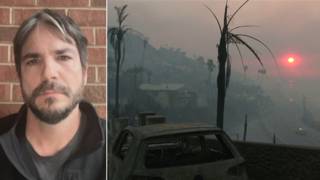
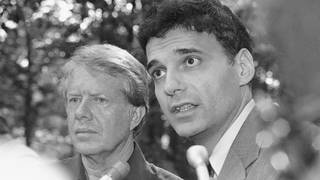
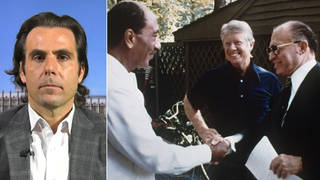
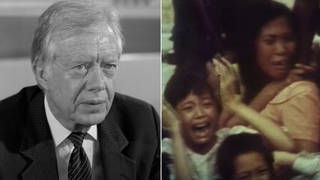





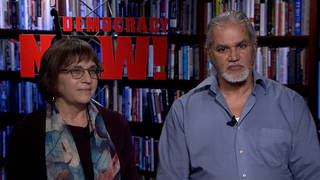
Media Options